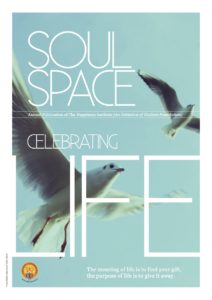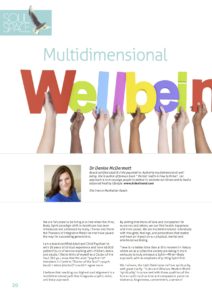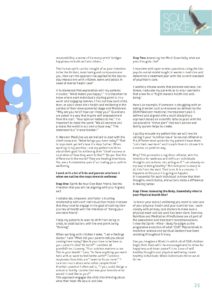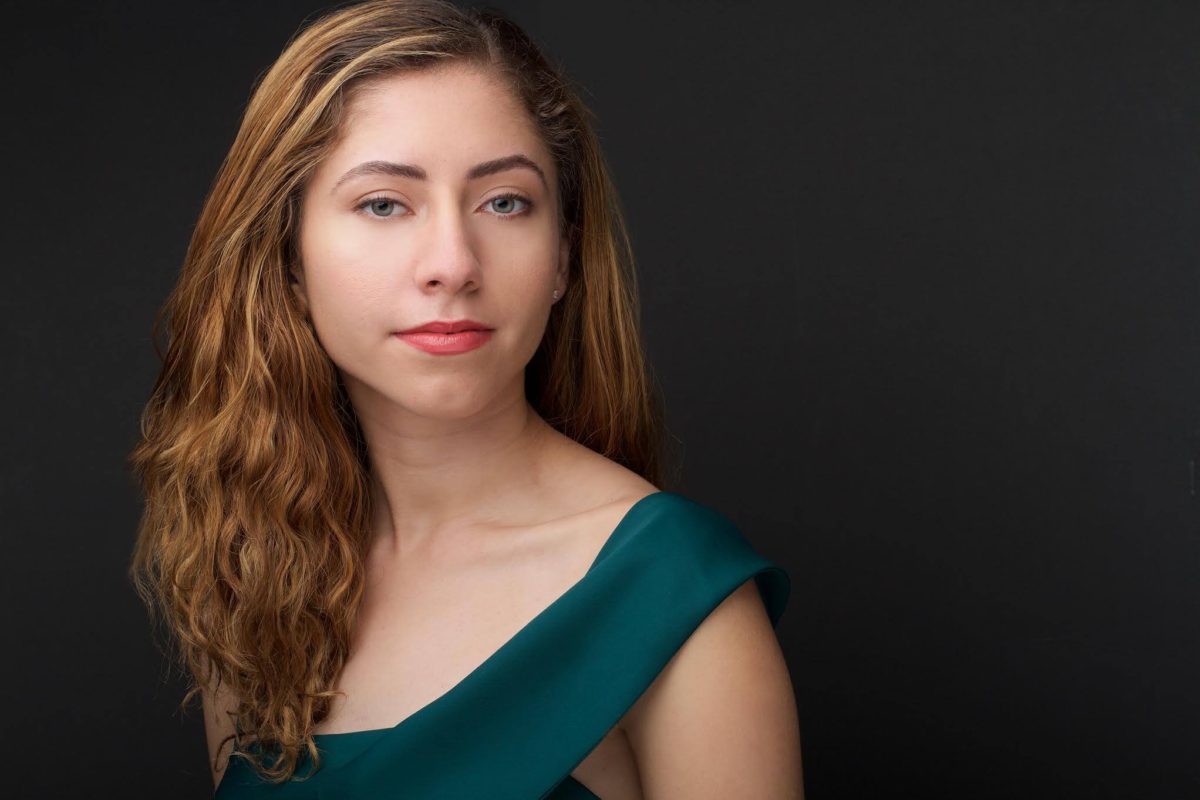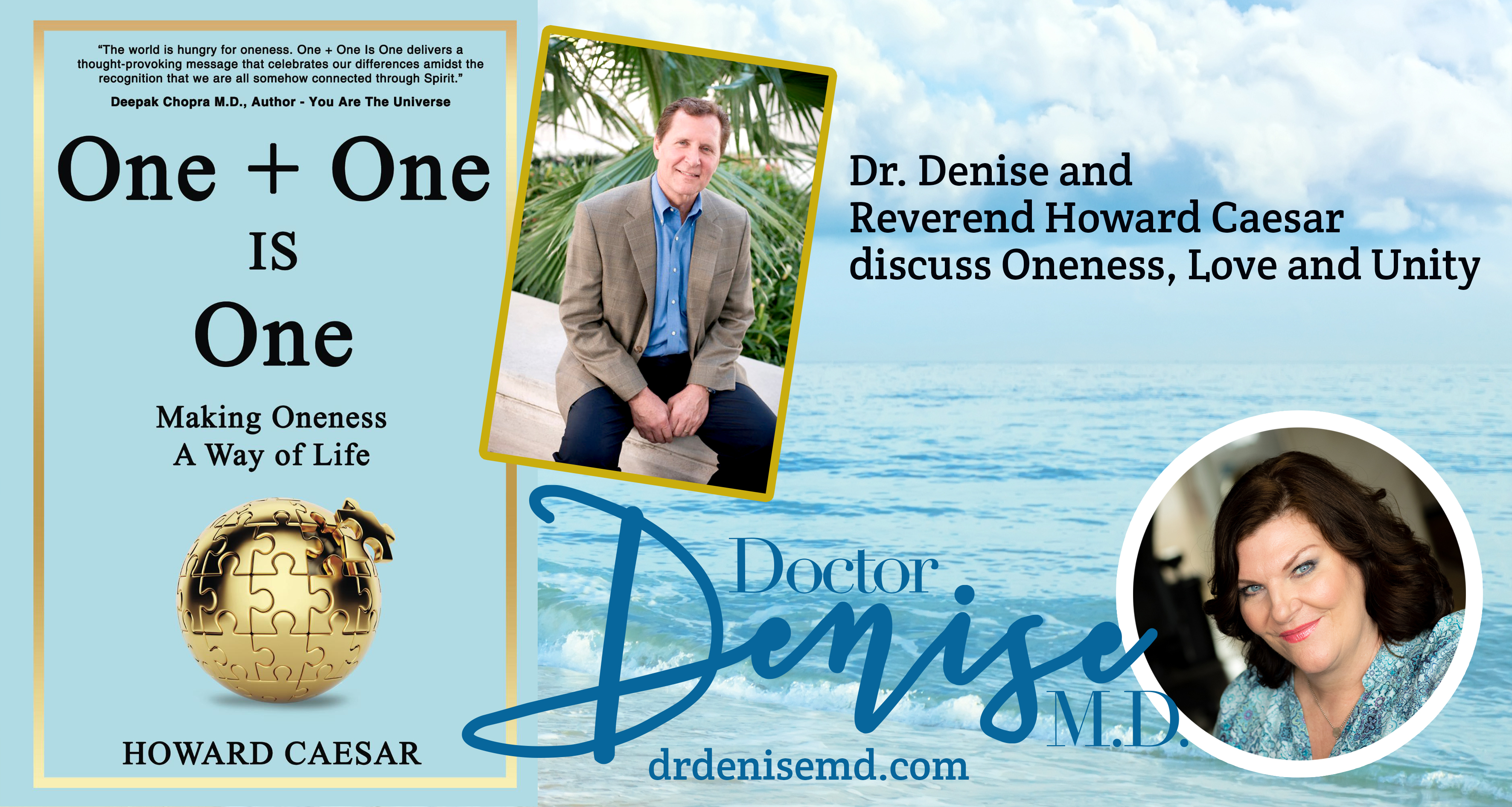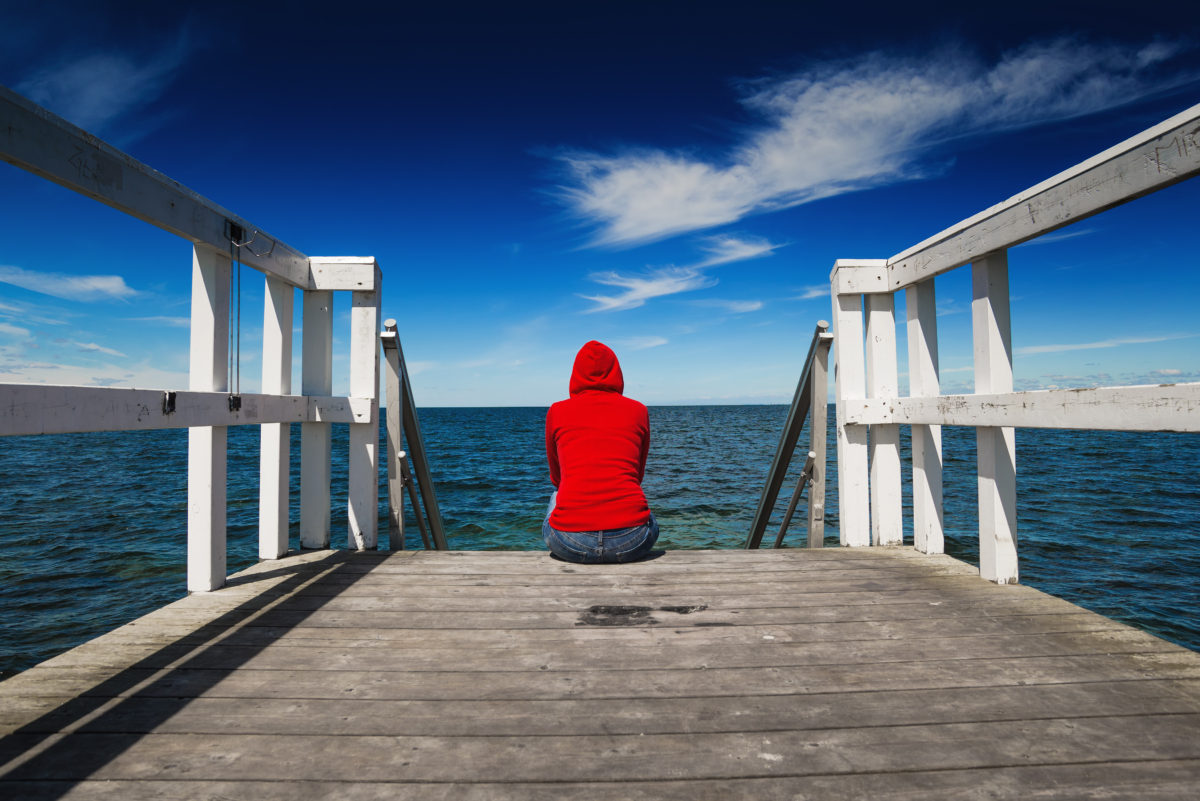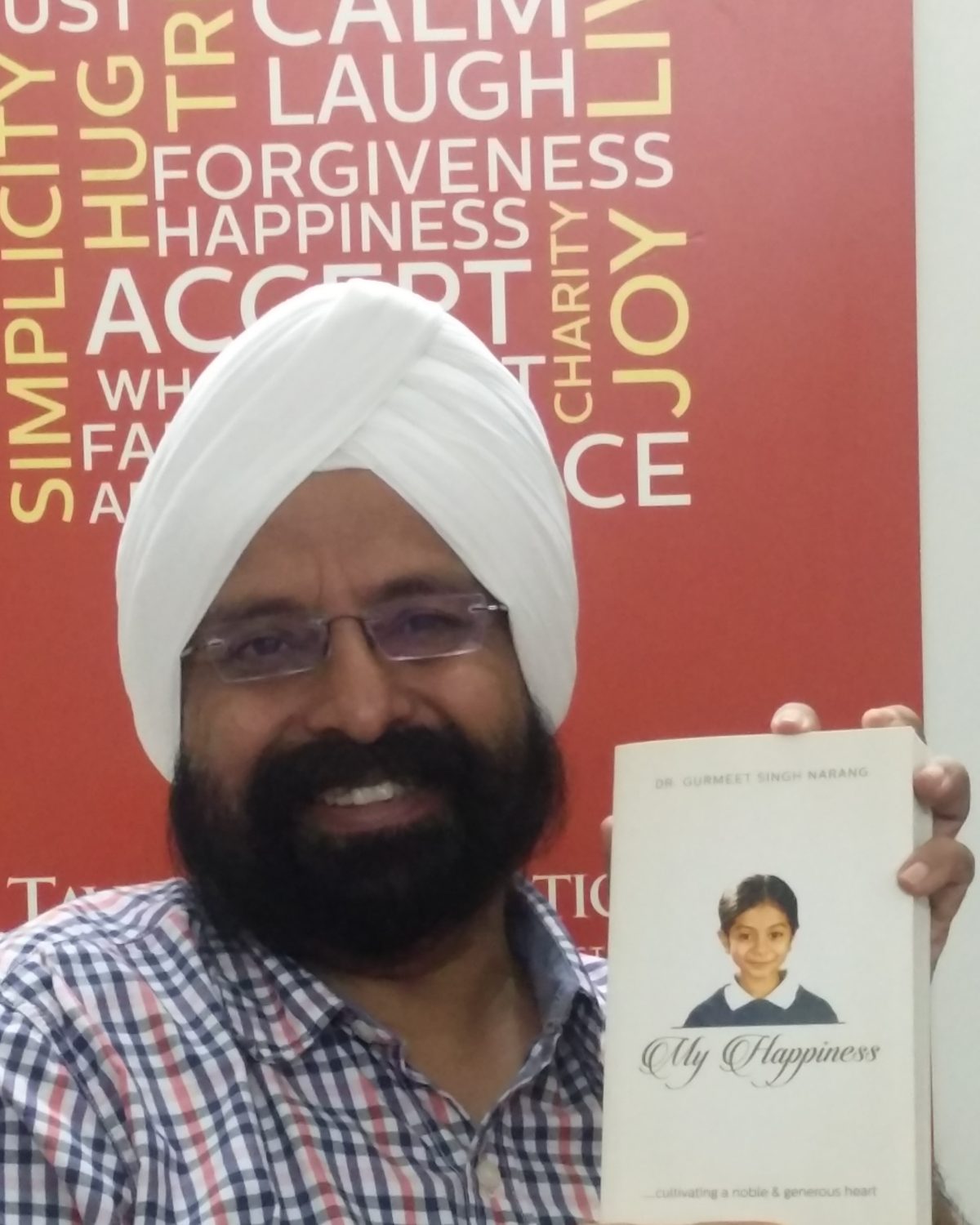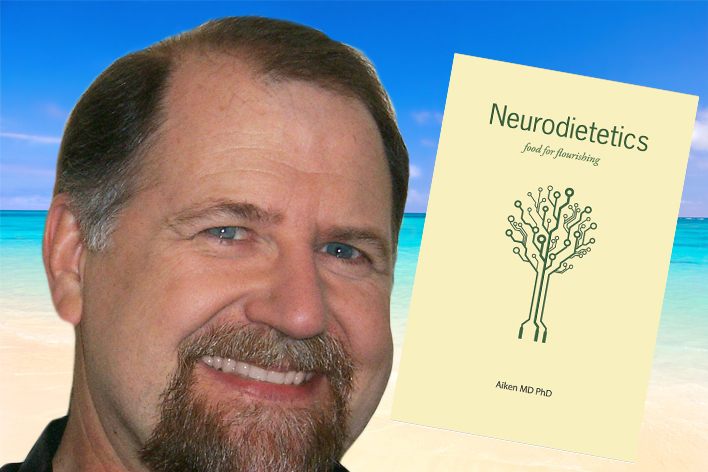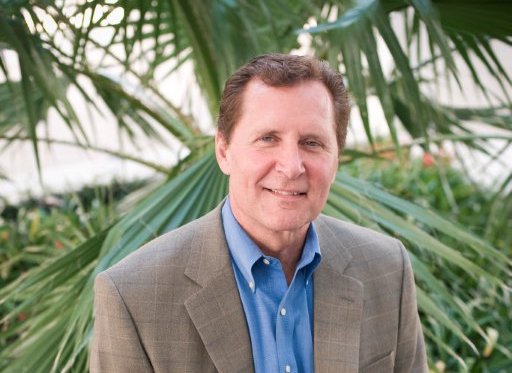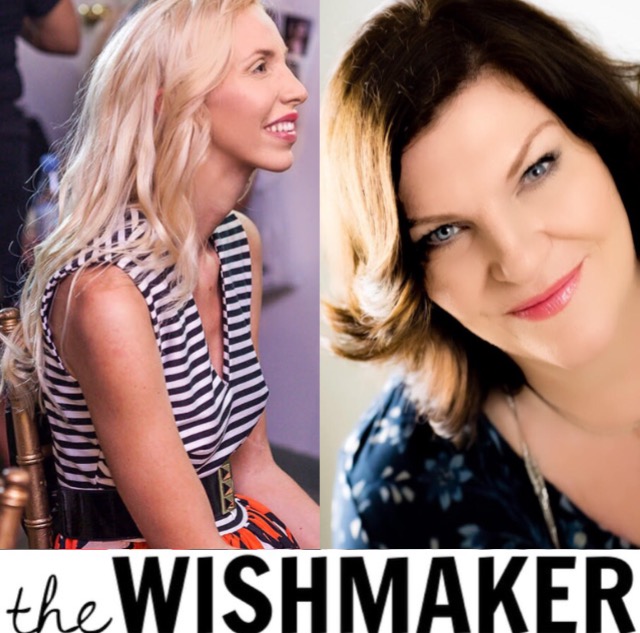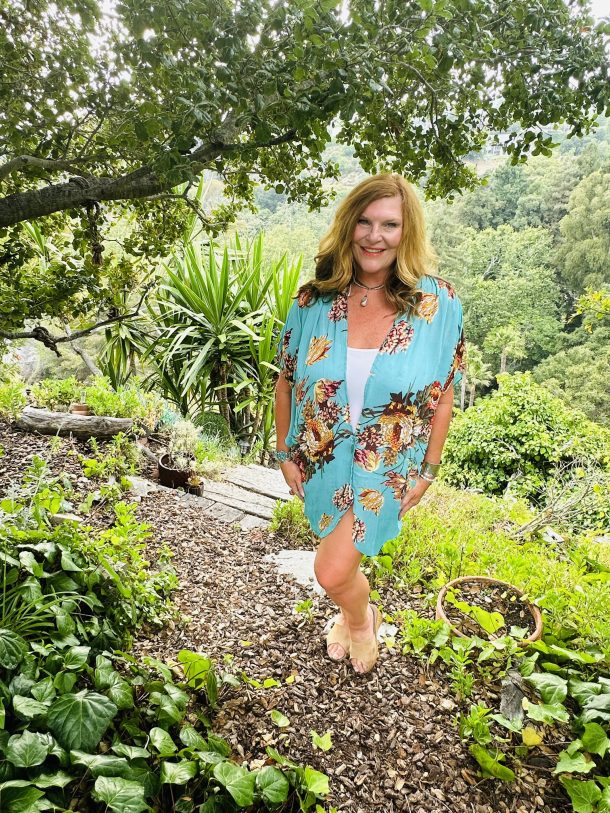There has been a lot of interest and commentary about my interview with Rev. Howard Caesar that was released on my podcast on 5/1/17. In order to make this valuable information available to as many people as possible, I have had the interview transcribed.
Dr. Denise: This is the Dr. Denise Show. I am Denise McDermott, an adult and child psychiatrist specializing in an integrative approach to mental health. I believe in prescribing the least amount of medication coupled with a comprehensive treatment plan. My goal is to empower you to thrive and I take a multidimensional approach to wellness not illness. You are not your symptoms. Call upon your best and highest self to embrace your mental health. On this program you will meet many doctors, experts, and pioneers who have helped pave the way to shift the paradigm of getting rid of the stigma of mental illness in our society. This show was created for those of you who would like new ways of thinking and understanding about mental health and helping your loved ones to thrive in empowered ways.
Today I have the honor of interviewing Howard Caesar, he has been speaking, teaching and inspiring audiences of his transformational spiritual messages since his 20’s. Recognized as a leader in his field, he has served and built two large ministries. The most recent being in Houston, Texas where he has served for 30+ years. His positive, practical, progressive approach to spirituality has inspired thousands of people to live happier, more prosperous and fulfilling lives. He has traveled the world, lead pilgrimages to other lands, and he has presented uplifting messages to tens of thousands of people via radio, tv, and the internet. Always communicating inclusivity, diversity, love and oneness and today we will be discussing his new book, One Plus One Is One.
It’s just such an honor to have you on the show today Reverend Howard.
Rev. Howard: Well, I’m delighted. I really appreciate getting to know you and learning what you’re about as well which I’m very impressed with what I’ve come to learn.
Dr. Denise: Well thank you, and you and I were introduced this week by Chris Bridge, my dear friend and children’s author of The Same Heart, this is a book that gives the message we are all different and each and every one, and we are all the same. So, this message of oneness is near and dear to my heart, and I know it’s really near and dear to yours too, and that’s actually how we met.
Rev. Howard: I met Chris this week, well, I’ve known her a little bit but it was great to see the work that she’s doing, she brought her books in and I just resonated with what she was doing. They were really on the same page, really wanting to bring people together in oneness, the truth of oneness, that we are all family. She’s doing it with a real focus on children whichi s great, I really hope to help further her work as well.
Dr. Denise: Yeah, and I think for me personally, as a child psychiatrist, and as a mother, 70-80% of lifelong mental health issues start before age 24. And so I think a message to reach our children about the importance of awareness, self love, other love, peace, and unity, the sooner we can do that as parents, as spiritual leaders, as doctors, the better society is going to thrive, and we’re going to thrive.
Rev Howard: I agree, I really agree. I think it would be great if it was built into the curriculum of school systems a whole lot more. To really teach some of these things that are spiritual, and they wouldn’t have to necessarily divide it by religious lines, who is going to argue against oneness and love, right?
Dr. Denise: Right.
Rev. Howard: That makes the world work.
Dr. Denise: Right and I feel incredibly fortunate, where I live in Manhattan Beach, now are you familiar with Goldie Hawn’s program, The Mind Up Program?
H: I’m not, I’m not.
Dr. Denise: I t’s really fascinating. They’ve reached 1 million people so far, and it is that concept of an innovative curriculum, and so my son is learning about kindness, compassion, he’s also learning about meditation. And on every Wednesday they have a group, a kind of a spiritual kindness compassion day where the whole school gets together in the morning, and they sing a song together, and they give out kindness awards for each of the grades in the elementary school.
Rev. Howard: Wow, that’s wonderful. That’s great. We got to have more of that spread around through the world.
Dr. Denise: Yeah, and they also really emphasize the importance of the environment and which classroom has been recycling and so I think that kind of integrative well being is something that is important.
I just would love to hear about your book One Plus One Is One and the inspiration on that book because I think that resonates with all the topics we just brought up.
Rev. Howard: Yeah, I actually feel like my divine plan in life has been about oneness, since I was a little child it seems like that was something I would look around and perceive and be questioning why there were all this dividedness and divisions, and we went through high school, being a Protestant, dated a Catholic girl, it was worrisome to the parents, they were all on edge. There was just all this sense of dividedness in different areas and so and later, well actually I was in my early twenties, and I found a path that was for me felt right because it was about bringing humanity together in oneness and really recognizing and honoring all paths. And so from there became a minister and was speaking and teaching for some 40 years and have just written my first book, and want to just take it, again, to the next level. So, yeah I’ve written a book called One Plus One is One, and I have an 8 year old grandson who was on the phone with me and he said, he calls me Papa, so, what’s the title of the book? I said it’s One Plus One is One, and there was a long pause and he said, Papa, one times one is one, one divided by one is one, one plus one is two Papa!
Dr. Denise: Oh, don’t you just love kids!
Rev. Howard: So, anyway, yeah, yeah, but anyway, I’ll be explaining to him and he’s excited about the book, but you know it’s the principle that is earthly math you look at object and we look at each other and we think there’s distance and separation. One tree plus another tree adds up to two trees, one apple plus another apple, one person plus another person, it all seems to look like it sums in total you know way beyond one, but in spiritual math, in cosmic math, in spiritual universal principle, we’re really all one, we’re one family and in the spiritual level and domain there are people that are waking up to this, they feel that their core, they’re longing for it, they’re reaching for it, they’re hungry for it, I really feel there’s a wave of this kind of energy being birthed right now.
Dr. Denise: And I couldn’t agree more. I couldn’t agree more with you and I think in this time in history it’s really interesting when you talk about the energy of the universe, and how, I just actually before I was going to have this call with you I watched an interview that you did on the Deborah Duncan Show with Deepak Chopra back in 2015, and you and he were having an interesting discussion about cosmic energy and positive forces and negative forces and things balancing out, and I think we are living at such a time where people are using a lot more divisive terms and needing to be like, “What team am I on? What team are you on?” So, I think this also gives people who are thinking in terms of oneness and unity to really step into their power that they have and really that any act of kindness, love, and compassion, towards oneself, creates, or to others, creates a ripple effect that can raise the vibration of collective consciousness.
Rev. Howard: Absolutely, absolutely. Everyone has an opportunity and that’s part of what the book is about. You know, we change the world one person at a time, and every person who is willing to work within themselves to take greater responsibility for reminding and remembering their true self is about love to come from that. And the biggest obstacle that people have is really starting with loving themselves, because you really can’t give away what you don’t have yourself. There’s a lot of healing that needs to be done in people that have been conditioned in various ways through their childhood through situations and circumstances, people have been wounded, and gone through pain and suffering and is basically is the result on some level of creating a separate self. And so what we’ve created we can also release and let go and return to our true heritage which is really that we are all one.
One with the one Divine, the one presence and power in this universe. That takes us into a oneness with ourselves, our true higher self, the more we connect with that, identify with that, then the more we have to offer and help others as well. And make a difference really as the circle continues to ripple out and become part of the critical mass, really.
Dr. Denise: Yeah, and I think for children, they’re so connected to source, and to love, that it’s such an amazing time to give children a set of tools, at a very young age with help from their parents influence or teachers, a spiritual presence of prayer or mantra, or meditation, so that people can realize that they’re having a witnessing awareness of their experience here. How am I feeling today? Is my stomach okay? Am I sad? Am I happy? When people have an awareness of their emotional well being and their physical well being and they’re trying to get to a place of being “your own best friend” and loving yourself, that actually can help you remember and stay connected to your higher self.
Rev. Howard: Absolutely, and I think, I think a big part of it is we tend to try to escape our feelings and then we go numb. It’s wonderful to be able to be with a child who is able to feel everything. That’s why I think it’s important to talk about a child’s feelings with them as opposed to making them wrong. And just talk them through and ask them what they’re feeling and why they’re feeling the way they are and making it okay and having a level of understanding then taking them around to seeing another way of perceiving a situation. We’re creating neural pathways all the time and it’s crucial at the time of a young age, and if you can help them develop perceptions, and really actually neural pathways as they’re talking about in brain science, then these days the child is almost automatically going to slip into those things they have learned and the seeds that have been planted at a young age.
Dr. Denise: Yeah, and I really look at it as a child psychiatrist, doing a lot of cognitive therapy and talking to people about their mindset, and positive ways of thinking and I like to teach my son, and my son is 8, about the importance of words, actions, and intention and that everything is energy. We know that in the physical manner, the neural science, but from a cosmic level that’s true, too. And then I teach my patients ways to cope with cognitive behavior therapy strategies, and to shift to positive thinking.
So, can you share your message about positive thinking and the vibration of love verses fear? And the way you’ve worked with people throughout the years from your perspective?
Rev. Howard: Sure, um, basically, it’s always in it’s most simplest terms, that, really, separation is our greatest problem. At some point in our lives, we basically separate out from who really are and our truest selves as children. And that’s why even Jesus becomes a little child, it’s kind of returning to that state. And what happens is we get filled with a lot of concepts of what to do and how to be through all of this we lose a sense of ourselves and our authenticity. And so it’s a matter of returning back to just loving ourselves for who we are and just coming from a place of being-ness. As opposed to having this um, this stress of having to be this, or having to become that. It’s loving ourselves where we are in each moment as we’re continuing to evolve, and live our lives. And, I just believe so firmly that at our core every person is absolutely beautiful, wonderful, whole, complete, pure, perfect, absolute goodness. And what happens is that true self gets covered over by a separate self that we make along the way. And a lot of it has to do with simply the conditionings, you know the things we introduce to the different voices in our world, the different things that happen to us, and circumstances, and uh, and a lot of times, it becomes a matter of unlearning and releasing, letting go some of the things we have in consciousness covered over who we really are and really meant to be. So, if you can help a person release those things that have ultimately kept them in fear, or anger, or wounded-ness then they begin to find who they are once again, begin to love themselves once again, then they’re able to love as well as receive it in and their world becomes more joyful and peace filled.
Dr. Denise: Yeah, and I completely am in alignment and it’s really interesting, 20 years ago when I decided to do private practice, verses working for someone else, I realized when I was in the hospital, I looked at my child psychiatry at UCLA, I loved my training, I also was in the South, at Emory University, however, in Western Medicine at the time I was training, it was the decade of the brain and how a lot of the words that we choose can keep one feeling sick, or ill. And so, as a doctor, it felt, the words that, and I really honor science. I am so happy I went to medical school, I’m very very happy with that, however, I intuitively knew that I had to go and work on my own so I could be in the energy environment that really would help my patients to heal, and then also, the words that we choose because the word mental illness verses mental health, or the word disorder verses reorder.
I think that for people, knowledge is power, so let’s say, for instance, someone comes in and they’re having generalized anxiety, I like to take a multi-dimensional perspective which includes my modern medicine understanding and also integrate with Eastern philosophies, but I also really just sit there and just connect soul to soul with someone. And, so I also like to teach peoples, and someone’s like, “Oh, my goodness, generalized anxiety, oh great, now I know what’s going on.” That’s fine, but also help people not to land themselves there, not to define themselves from a place of illness and actually imagine and also to embrace the struggle because we all have crisis, we all have struggle, and so I think it’s very important, I’m interested in hearing your, how you handle this and people you work with. But I really try to educate, and then if someone needs medicine, that’s one tool that’s in my toolbox, but I really want people to come from a place of empowerment, a place of self love, and a lot of people when they come to see a psychiatrist, they’re feeling really shameful, like there’s something wrong with me, and so, that’s one of the reasons why I’m reaching out and doing the work that I’m doing now.
I do believe that the sooner people can realize self love and self awareness and that everyone has different feelings and thoughts and not to judge them, that’s going to help societal mental health, and that people won’t have the shame in reaching out for help, whether it’s coming to talk to you, or coming to talk to me. So, I think it’s really important that we teach our children at a young age that the words that we choose, the actions and the intentions, carry an energy vibration, that can make us feel well, or can contribute to us not feeling as well as we can. What are your thoughts on that?
Rev. Howard: Well, I agree completely. I think labeling is always very dangerous because then it kind of locks the mind into this is what I am, and we have to be careful where our identity is really formed. Where we live from. The best thing we can ever do in terms of empowerment is keep our identity pure and whole and complete and just have an unconditional sense of love for ourselves. I also think it is important that a person learn that, you know the only place you can really feel is, you can’t feel with your mind, you can’t feel a thought, you can only feel in your heart and so if you’re living in your head and your intellect alone, um, basically, it’s the heart that knows the way. Wisdom is where it resides, in the heart. And so, the more that we begin to stand back and see that we have thoughts but we are not our thoughts, we have a mind, but we are not our mind, we have a body but we are not our body, and begin to learn to be in that part of themselves that is the observer. And is able to check things out, be in touch with themselves before they say, and be in touch with actually looking at what their thoughts are and whether these are healthy for them or not. And choose higher. And again, it’s just back to, whether it’s children or any stage of life. To be more self-observing, and more conscious and to choose higher, always.
Dr. Denise: Yes, and I think some tangible tools kind of in the throws of motherhood, with my son, I try to say, “Was that kind? Or unkind?” And at times my husband will say, “That was rude.” I know that the term rude is in our modern vernacular, however, when you choose the word unkind verses kind you are actually raising the vibration, you’re expecting a different expectation, and so I guess I would say I feel really fortunate that I adopted my son when I was in my late 30’s because I had a lot more wisdom. And so um (laughter) I also feel that teaching him, kids are such sponges, they pay attention to the words that we choose how we act, and I think very simple tools that we can teach our children and also parents on how to talk with their children, and to talk to themselves, cause I think we all try to heal at all different stages and ages of our life.
Rev. Howard: Mmhm, yeah, I think the key there would be as you use the example kind or being rude or whatever, it’s being able to say, well, I’m not rude, what I just said was rude.
Dr. Denise: Correct.
Rev. Howard: So, I know that, I’m not, I’m not that. So the identity still remains above whatever was said, whatever was done and they once again, they don’t have to shame themselves and they can just choose again and be aware and I think it’s great to teach a child the virtues of awareness. To be praising them from the level of how much you have become aware of yourself and are noticing and choosing higher, because everything is a choice in terms of how we direct these life energies that are flowing through us.
Dr. Denise: Can you discuss a little bit about the structure of your book and some of the tips and tools that you’re hoping that people are going to gain from reading One Plus One Is One?
Rev. Howard: Yeah, the intent of the book is to really help people connect, and realize that we are all one, to reawaken states of oneness. that takes people beyond their sense of separation which leads to various suffering and unhappiness in life. And take them back to love, joy, and peace. Now, I say that the three most important things in life are um, relationships, relationships, relationships. 1, 2, and 3. It starts with your relationship with your higher power, um, out of that you learn more of what is the truth. You also generate life giving energies moving through you and it’s about bonding, there actually is a bonding and a partnering knowing there is a presence and a power that’s working through you that gave you this life and that it’s precious. And there’s an honoring of it, so it starts there. And from there you move into the fact that this power lives within you so it’s about your relationship with yourself, knowing yourself, knowing your higher self, and identifying with that and starting each day by identifying with who you are, this higher sacred self that is a part of you, that you have come to express and it’s true nature, it’s essential nature is love. And so, um, out of knowing yourself, you move into the states of loving yourself more and more and accepting yourself and when you’re able to accept all of yourself, and even your humanness, even your flaws, then you’re able now to really unconditionally love and accept others. Because we recognize we are all in the process of evolving and perfecting, and bettering ourselves in terms of expressing the highest and best that is in us. And so as we learn to accept others, um, again, we begin to impact our world. I also feel, you know, an area in which I say and teach, you know it’s all God. It’s all God.
There’s that Greek philosopher Empedocles.There are many people I think that who say unquote who said this but it was actually that Greek philosopher 500 years before Christ who said God is a circle, whose center is everywhere, whose circumference is no where, meaning nothing is outside of the circle of this life, this intelligence, this living loving energy, it’s all God. And so then it becomes a matter of actually looking at a tree and knowing, you know, there’s a life in this tree. There’s an intelligence in this tree, and in a flower and so everything is alive and it can speak to you, animals can speak to you.
I’ve been and seen where sages have carried an energy in which where, um, oxen who were walking around and would be just coming up to this individual because it’s consciousness was so pure love and has such a connection with these animals. And, of course, St. Francis of Assisi demonstrated that in others. But one of the chapters is about recognizing that everywhere you go, and everything and anything is within the circle of God, the stars, the sun, the moon, everything. When you begin to awaken that awareness, there’s a shift inside that makes you feel so connected with it all. Uh, it’s a new, empowering energy.
Dr. Denise: I’m just smiling because I’m very attuned to the words and the thoughts that you’re saying and, I just, I think children come into the world so connected and aware, and full of love and it’s like we said earlier in our talk then they forget. So I think daily tips and tools to keep people in that state of grace, and awareness, are very important. And I’m going to share a couple of my tips and tools, and I would love to hear yours. I know a lot of my patients are like, “Fine Dr. McDermott, that sounds great but I’m really annoyed with my da-da-da-da.” So, they’re like, what are some tools? Give me some tools.
And so one thing that I like to, by the way, I think we all have our ability to connect with what our own tools are, this isn’t me telling you what to do, I think giving ideas are very important and that spurs and you kind of co-create together.
But being in a place of gratitude, I think before your feet hit the ground in the morning, I like to pause, I like to just think, what am I grateful for, what’s ahead of me, what challenges, and then I like to create a way to stay in gratitude throughout my day, ‘
because that’s a tool that keeps me connected to my higher self and to my awareness. And then, what I like to do, ‘cause some of us are more visual, some of us like words, some of us like to pray, some of us do moving meditations with exercise, so I think I like to encourage people to find their own way, where they stay connected to gratitude and a place of love. And I try to work with my patients, so not only the change your thinking, and the western way, but I help them get their own tools in their tool box. So, how about yourself? What are some tips and tools that you would give or things you like to do to give to stay in that space?
Rev. Howard: Well, I really love nature. So, I have to get out in nature from time to time, but I’m also really blessed that at this point in my life I have a home on a small lake, and it’s up against a nature preserve, and I have lots of flowers that I plant in the spring, and each morning I get up and go outside, and just, um, breathe it all in, feel it, say Hello to the flowers and the trees, and all of it, and as you say, just immensely grateful for what I’m surrounded with, the life I’m living, and just gratitude throughout the day is super. I also, you know have, I meditate everyday and of course that’s a very important time for me in connecting, you know that launches me as well with energetically. And I use affirmations,
I like to surround myself with photographs and pictures, and things that speak to me and remind me, you know of a truth, or just kind of smile back at me, whether it’s a picture of my grandchildren or if it’s of my family as a whole, my children, things like that. When it pertains to a child, I think it’s great to have a child learn to meditate but also, be given a pet of some sort that they can love, there’s just something about them feeling like this is theirs to care for, that’s very healthy. And, even I suggest to people and children, just having a plant to help it come along, and talk to it, and ideally have be it a plant, even if it’s just in a pot, if they’re living in an apartment or something, put it on a window or something, something that blooms. There’s kind of this life that is speaking to them, and it’s emerging, and it has a message. All of those things I remember just being so intrigued, even as a child, watching the seed of a bean grow through a glass, and you know, you watched it burst open and come up and push through and the soil and I still remember that to this day. You know, there are ways that children can see and feel and just feel the glory of that life.
Dr. Denise: I agree with you, we have our own little zoo here in our house. We have a Newfoundland dog named Boomer, he’s 180 pounds. And then my little 8 year old really wanted a…
Rev. Howard: Oh, my God, 180 pounds?!
Dr. Denise: Yes, yes. He’s like our own little mini horse. And then we have two cats that we just adopted, Leo and Nova. And then our 18 year old wanted rats, so we have 2 rats, and we also have a little hamster. So, we don’t live on a ranch, but it sort of feels like we’ve got our own little zoo here, in the beach cities.
Rev. Howard: Yes, yes. Yeah, that’s great.
Dr. Denise: And I agree with you it’s about being connected, and other living beings and sentient beings, just I think also what we’re just describing is being in the love, or being in awareness of all that is, when you’re really surrounding yourself and feeling like you’re a part of it and integrated, then you can really realize the oneness.
Rev. Howard: Yeah, and you know, another thing that is important is that through our childhood we’ve had moments, moments where we’ve felt connected, to where we can go back and remember, whether it was a time laying on our back in a field looking up at blue sky, and watching birds fly over, and we just had some sort of a wave of energy come over and touch us in our hearts and just an expansive feeling. And I’ve always asked people if they can remember moments, and every person can cite moments, whether it’s from their childhood or various points along the way in their life where they were given precious sacred moments of feeling really connected and it’s important to remember those and carry them with you, and go back to those and say, that lives in me as a reminder, of how it can be, and just to get into that energy, sink into that energy, and, and carry it forward into your day, into your life, but those are meaningful moments not to be forgotten.
Dr. Denise: You know, that’s really a great point to be made, when I see people they usually come to me as like the last line of defense when they’re done everything they can. And one of the questions I ask them is when is the last time you remember feeling joy? And then we go back, and they…
Rev. Howard: Mmhm, that’s great.
Dr. Denise: They think about it. They think, where was I? What was I doing work-wise? Who was I hanging out with? What kind of fitness routine? Where was my passion to get connected to what really fuels their soul where they feel alive and they feel well.
Rev. Howard: Yeah, you know sometimes the separate self, which is a creation of the mind, and really we are not saying the mind is bad by any means but if you don’t use the mind, the mind uses you. So, that’s, you have to transcend the mind or begin to master the mind, and to use it properly. But, if you, um, I lost my train of thought where I was going. Um, oh, what was I going to say? Forgive me.
Dr. Denise: That’s ok. We’re just talking about the wellness, and over all the joy, and reconnecting to joy, and for what that’s like for someone to really feel alive. Talking about the mind, the mind can get in the way.
Rev. Howard: Yeah, and I think it’s just being able to take charge of the mind, and to, again, remember that you’re partnering with the heart. The mind and the heart are to become really buddies. And the more you bring the heart into the mind, and you’re bringing wisdom in as well. And look at what it is you can let go of, but the mind, I know what I meant to say is that the mind actually separates itself when the ego part has a problem. And so it’s almost learning that there’s a part of the mind that wants to focus on a problem, and if it doesn’t have a problem, it wants to go find one, and that awareness is really helpful so that you begin to take charge of your mind and see that this is really characteristic of a separate self that has been created and it’s the only way that it continues to have life so that you continue to move yourself back to something positive, something good, a reminder of who you really are, what life can be, you’re higher intentions, loving yourself, loving others, sometimes I think when people are most inactive, that separate mind takes over and they just dwell on the problem, focus on it and it eats them up.
Dr. Denise: Yeah, and I’m actually, I just, that was someone yesterday. And I think what we’re talking about is when people get in a place of feeling stuck, and that rigidity, that ruminative thinking over and over again, or playing a tape in your mind that just no longer serves you. It just doesn’t serve you, but you can’t help it.
It’s like you’re going to, it’s like when you’re stuck in a car, you can’t get out of the parking lot. And da-da-da-da-da-da. And so for instance, yesterday I had someone who kept saying, “But, Dr. McDermott, was so, I was so traumatized by what happened in 2015 and I kept going over again and saying it and saying it.” And I asked the person, “Is this something you do everyday?” And she said, “Yes.” And I said, “Ok.” Then we broke it down and I said, “You know, you don’t need to say that to yourself anymore. We’re in this moment right now.” I validated that it was awful, that she had a trauma, cause a lot of times people have PTSD or Generalized Anxiety, and there’s a tape that keeps going back and so I think sometimes people do need to see a psychiatrist and even be put on medicine.
I do a lot more than that. I give cognitive behavioral tools, meditation, prayer, so I’m not against prescribing, but it’s not my go-to.
So, I don’t want to minimize for anyone listening that there’s times that medicine can be very helpful, however, you have to have a routine to hit reset, in a place of self love, and sort of list out what’s no longer honoring you. Cause the animal part of us gets in our behaviors, and the rigidity and chaotic part of, that’s really the mental illness, and the disorder, and the reorder thinking is coming from a place of love, awareness, heartfulness and compassion. Compassion for oneself, and compassion for others.
Rev. Howard: Yeah, it’s really important to stay active in the moment, in the now, because if we don’t our mind will take us into the past, about something to mull over, or, it will be about worrying about something in the future. Your, and life, is really lived fully in the moment. That’s really where, uh, you experience life. You’re not experiencing life if you bring the past with you into the moment. Or, if you are worried about the future, and you bring the future into the moment. We’re all going to have a certain amount of fear when we are in the leading edge that’s new and unknown, that’s ok, we have to make it all right and make our peace and just breathe our way through it cause that’s just being human. But the more we can bring the divine in, and trust that even though it’s unknown, this can be exciting, this can be meaningful, we can create a picture of how we would like it to be. Not make a right or wrong, or have to judge ourselves as passing or failing, but experiencing life. The mind tends to want to judge, everything and judge ourselves, and judge others, and then all that does it separate ourselves from ourselves, and from others. It’s just a tendency of the mind that we’ve been conditioned into doing because we tend to amplify the differences, and that’s again just a learning, conditioned factor.
And again, my book is intended to take us beyond that. To see how that stands in the way of a joyful life, a life that really is full of peace, love and connectedness. There can be an absolute shift vibration in a person as they go through this book, and begin to find themselves, once again.
Dr. Denise: That’s fantastic, and then, I just wanted to, it came to me, to finish up, just discussing the importance of disengaging, or, engaging in a positive way on social media, and monitoring the quality and quantity of news that one allows themselves to get everyday. I think that…
Rev. Howard: Right.
Dr. Denise: I love nature, I love everything we’re talking about but all the young generation, everyone is so connected to their iPhones, the news, they’re texting, they’re snap chatting, I have some tools and tips I’d like to share, but I’d love to hear your insight in how you talk to people about positive use of social media and how to be kind of self aware of how much news one can handle and the quantity and quality of information you allow yourself to receive everyday.
Rev. Howard: I’d love to hear your tools, too, but basically mine would be very simple and just say, they have to monitor themselves. They have to able to be in touch with themselves enough to be measuring how is this skewing their perception of the world, how is this impacting their life, how is this draining perhaps even their energies? What is life giving? How much is causing draining of energy? How much is contributing to their overall state of being? I think that everyone ought to discipline the amount of time that they give to all of this that’s coming at them. Because it can be endless and it can be so inhibiting in terms of the life that wants to be lived in you. So if it was a youth or a child, I would limit the amount of time that it was on and I would talk to them seriously about the impact that it has with them. Adults I talk with, we just have so much information coming at us from so many directions, and it’s just multiplying and it’s increasing, and speeding up, and so, everyone needs to be able to just have some compassion for themselves, to cool their jets, calm down, quiet their mind, be still, be with themselves. Because simply, all of this contributes to taking you away from you.
Dr. Denise: Yes, and I think what’s happened is, technology has grown at such a rapid rate, there hasn’t been enough scaffolding, a lot of the parents who are raising children who are not in this information age.
I have to tell you, there’s been an increase in suicidality since the late 90’s and there are multiple factors, diet, nutrition, the micro biome, you know, all different reasons, food is medicine, exercise is mind medicine. However, I do believe that there has to be some correlation when people started to be very active on their electronics. Cause there has been such a shift across all age groups of increased depression, and suicidality, and I talk about that, a little bit about that in my mental health and how to thrive book, and so I also interviewed some people who had some severe cyber bullying, and I spoke to Dr.Allen Tein who is a psychiatrist and neuroscientist from Johns Hopkins and all the data shows that verbal bullying increases for the person being bullied and the person doing the bullying increases the risks of depression by 2x the amount.
And, so, this is why Reverend Howard, I am so passionate about reaching our children, at the youngest age with these tips, tools and ways to connect with nature, mindfulness, unity, and oneness. And the specific tips and tools that I have for parents and for children, is, you know, first of all, limiting your amount of social media, limiting how you talk, having rules, is what I’m saying kind or unkind?
And my husband, I love what he said to our kids, he said, “If you were to put a billboard up, on the 405, which is the big busy freeway here in California, and you were to write that text message or you were about to put that, think about what you’re going to say as though the whole world sees when you do something on social media.” He gave that as our rule of thumb to our children, so that’s one tip. And then another tip is to pause before you hit send on something, a lot of times people will discuss very emotionally charged situations via text or email and are really conversations that should be done in person, when you’re making eye contact, and when you can hear the tone in someone’s voice. So, I think our children need tools on kinder communication, and realizing that there can be real positive things from using social media, but there can be things that are not positive about it.
Rev. Howard: I really think that there should be classes now that it’s become so dominant. I think that it should almost be a course in school, but they’re doing it themselves. And how far it takes them away from relationships with others, there’s so much time spent that they lose the personal interfacing with others and also the time that used to be spent just being with themselves. That’s just another escape, whether it’s TV, or the Internet. It can just be a way of not being with yourself and not being with others. So, people isolate. I think that’s some of the suicide, too, is that um, they just fill themselves with all the stuff that’s coming across there and they’re not able to be with themselves and with others in a way that is fulfilling.
Dr. Denise: I agree with you. They haven’t, haven’t gained the skills, they’re losing skills of interfacing with each other. I don’t think they have the skills because they’re inundated, it’s an addiction, so they’re feeding with an addictive mindset, that’s why I have such compassion for these children and so I think that the oneness message and the same heart and the work I do as a child psychiatrist, and the ministry work you do, I think that all different age groups to come together as one, and scaffold our wisdom,
I think that you and Chris Bridge talked about doing some work together. She and I are co-creating a book, that’s why I really think that as a child psychiatrist, and as a mother, I am setting a strong foundation of my presence on social media. I did not want to do Twitter, and all this image assets and everything, I was like, “Really? Do I have to do this?” And, I’m like, yes, I do, because I have to relate to the current medium of communication. I have to be relevant, because so many of our elders have the wisdom just like the ancestors and sages throughout history do, and so we have to keep up with the times. So, I agree with you, I think on having a workshop, perhaps that would be something really cool to do in Houston with Chris, maybe I can talk about that off record or at another time, but that kind of responsible communication that can actually promote more about oneness and unity, and compassion I think that’s a very important thing that we have to embrace as a society.
Rev. Howard: I agree, and I think people, people have a void, and they don’t know what to fill it, or how to fill it, or what the emptiness is. They can’t define it. But it basically boils down to they’ve lost the sense of being able to be with themselves, love themselves, love life. So much of the information that they’re getting is so much in, the head and in the realm on concepts and things that are going wrong and things to fear in the world, and all the judgments that the world is placing on them. Or people around them or what have you, they just need to really pull back from all of that and spend some time with themselves and be taught once again who they really are, and how precious they are and to move away from the mind and into the heart where wisdom resides, and where they’re able to again reach what is really called causeless love. That’s the ideal that we all want that to love without a cause. In other words, I don’t have to find something good about this or that person, or something good about this or that day, to have the energies of love flowing through me. And that’s something that is needing to be taught more to people, how to get there and to experience what is causeless love. Causeless joy. That is our norm. That was how we are meant to be. And that is the state of being from which we are to live. Needing to get back to that.
Dr. Denise: I completely agree with you. And, I know this has just been such an honor and privilege to have you on the show today. I’d love to, since we in such a spontaneous way set up the show too, want to set the intention that I’m going to make sure I’ll email or call you briefly afterwards and we will set something up outside of the show to discuss this more because I think it’s such an important topic and perhaps address it on another show.
Rev. Howard: Ok, that sounds wonderful. I thank you for, it was just kind of divine order, I guess, that you and I connected so quickly and so fast and that, you gave me this opportunity and I really appreciate it. And thank you.
Dr. Denise: Thank you. And I will be out in Houston sometime in the next 4-6 weeks, but for everyone listening, can you let everyone know that your book is about to be released and how they can find you and also there’s so many great interviews with you. Speaking of media, positive media everyone, if you want to look up Reverend Howard Caesar, there’s so many wonderful shows you’ve been on and pilgrimages you’ve lead, and the organizations you’re in. So, will you tell everyone a little but about where they can find you, and where they can order your book?
Rev. Howard: Well, I’m just actually launching it on my own website because I’ve been a part of a ministry and it’s website I, um, so it will be HowardCaesar.com and that should be up in the next day or two, and it will be continuing to expand and broaden. My book One Plus One is One, making oneness a way of life, by Howard Caesar, is available on Amazon, and so hope you check that out and um, and basically our ministry here is UnityHouston.org
Dr. Denise: Fabulous, Ok, well I’m so grateful, I’m just smiling, I know I’m not seeing you face to face but I hope you can hear my words, I have a huge smile of gratitude today for meeting you. And I look forward to further discussions and thank you for all the work you’ve done in the world.
Rev. Howard: Again, my pleasure, smiling at you as well.
Dr. Denise: Ok, take care, Howard, thank you. Bye.
Rev. Howard: You bet. Blessings.
Dr. Denise: Blessings. Bye. Bye.

